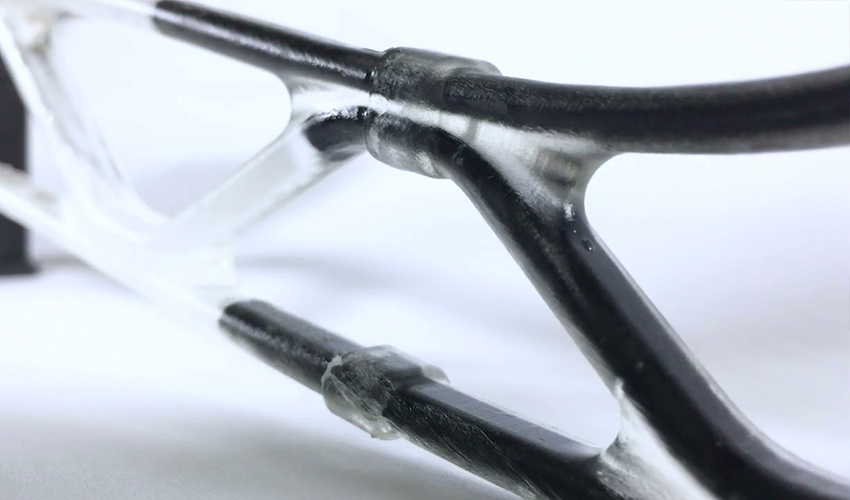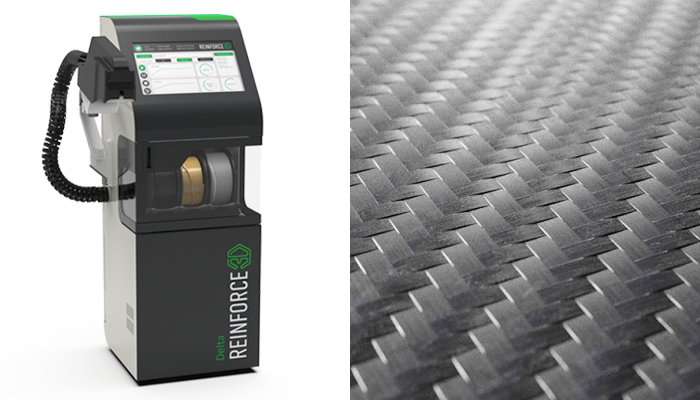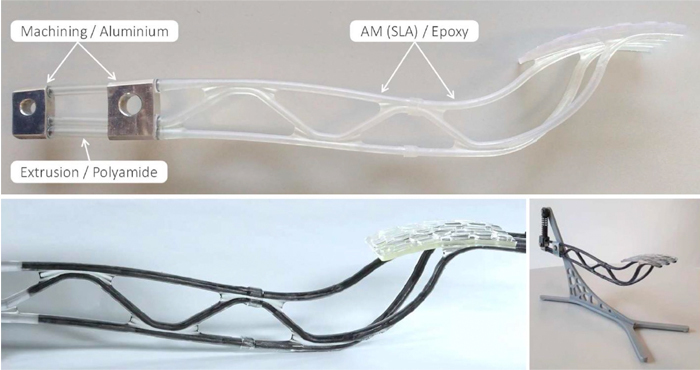CFIP, a Revolutionary Post-Processing Technique That Reinforces 3D Printed Parts With Continuous Fibers

In additive manufacturing, there are four fundamental stages: design, lamination, printing and post-processing. This last step is especially important, regardless of the manufacturing technology used, as it gives the parts an optimal surface finish. In addition, many post-processing techniques are used to reinforce the physical and mechanical properties of the parts. Take for example a new post-processing system that is expected to set a milestone in the additive manufacturing industry. The so-called “Delta” is a machine developed by the startup Reinforce3D using their patented CFIP (Continuous Fibre Injection Process) technology. This solution makes it possible to reinforce 3D printed parts by injecting continuous fibers making them lighter while allowing for a higher mechanical performance.
Reinforce3D was born as a project within the Eurecat technology center, located in Catalonia, Spain. But since 2022, an investment fund decided to invest and launch the startup we know today. Specifically, it was founded by BeAble Innvierte Kets Fund (BIKF), Eurecat and Marc Crescenti with the aim of developing a new post-processing solution for the 3D printing industry. Led by its CEO, Blanca Garro, the company has been growing while maturing its technology in a short period of time. Thus, its Delta industrial solution, which uses the CFIP process, will be presented during Formnext 2023, in Frankfurt, and aims to change the paradigm of post-treatment that we knew until now. To understand a little more about what this new system consists of, as well as the applications Delta and the performance of CFIP technology and industries it is aimed at, we tell you below all its properties and characteristics.

The Delta from Reinforce3D allows users to strengthen parts through the injection of continuous fibers
A Closer Look at Reinforce3D’s Delta and the CFIP Technology
The process of reinforcing 3D printed parts using CFIP represents a significant innovation in the additive manufacturing industry. What was once only a developing technology is now a reality with the advent of Delta. Instead of strengthening parts during the manufacturing process, as is common in conventional 3D printing, the CFIP system focuses on improving part properties in a subsequent step. Specifically, this method involves injecting continuous fibers into the parts to drastically improve their strength and performance. Instead of using short fibers, continuous fibers (such as carbon fibers) are injected into pre-designed tubular cavities in the part. These fibers are carried by a resin that cures, strengthening the structure of the part.
The main advantage of continuous fibers over short fibers is their ability to exponentially better part performance rather than simply incrementally improve it. In addition to carbon fibers, CFIP can also work with glass and Aramid fibers. Moreover, Reinforce3D has plans to expand its use to natural fibers in the future. The team explains: “The Delta machine is an evolution of the technology that adapts it to the rapidly evolving industry, automating the process and facilitating its use in production. In addition to strengthening parts, CFIP enables the integral bonding of different components by injecting fibers through them. This creates fiber continuity from one end to the other, resulting in stronger bonds than those obtained with traditional methods, such as adhesives.”
But what is the advantage of this method over conventional reinforcement during the manufacturing process? Well, the Delta machine stands out for its versatility and compatibility with a multitude of additive manufacturing methods. With it, users can turn to more production-focused 3D printing technologies, such as HP’s Multi Jet Fusion, which work with thermoplastic polymers. As it is compatible with these materials, it allows the user to use them and obtain optimal results without having to resort to more expensive ones. It is worth mentioning that the Delta machine not only works with plastics, but can also be applied to a wide range of additive manufacturing materials, including metals and ceramics.

CFIP is compatible with a number of techniques and materials including plastics and metals
Another remarkable aspect of the machine is that the amount of material used can be reduced. This is because hollow parts can be created that will be reinforced with continuous fibers to provide the same rigidity as if they were not empty inside. The CFIP machine is easy to use thanks to a graphical user interface on a touch screen. Furthermore, its compact size makes it suitable for use in laboratories and workshops, allowing it to coexist with conventional 3D printers. It is also Industry 4.0 ready and can be integrated with automation and robotics systems to create an efficient end-to-end production workflow.
Reinforce3D’s Role in the 3D Printing Industry
Reinforce3D’s CFIP technology is expected to be a game-changing disruptive innovation in additive manufacturing. Its ability to improve the performance of 3D printed parts significantly, its versatility in terms of materials and its potential in various industries make it a promising technology for industrial-scale 3D printing. With the launch of Delta, the company hopes to open up a range of possibilities for users looking to offer advanced properties to their final 3D printed parts. Although this machine is expected to be commercialized from 2024, we have already had a glimpse of its main features and what results we can expect from it.
In addition to the Delta machine, Reinforce3D also offers a consulting service for companies looking to adopt CFIP technology. This service covers different areas such as topological optimization, 3D printing process, injection molding, testing and cost estimation in industrialization. Whether you want to learn more about the Delta solution or you are looking to request the consulting service, you can visit Reinforce3D’s website HERE also be sure to visit them at Formnext at booth B119 in Hall 12.0.
What do you think of Reinforce3D and its CFIP technology? Let us know in a comment below or on our LinkedIn, Facebook, and Twitter pages! Don’t forget to sign up for our free weekly Newsletter here, the latest 3D printing news straight to your inbox! You can also find all our videos on our YouTube channel.
*All Photo Credits: Reinforce3D






